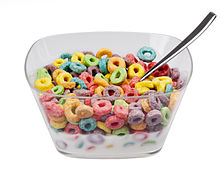
Back Alimento ultraprocesado Spanish خوراک فوق فرآوری Persian Ultraprosessoitu ruoka Finnish Aliment ultratransformé French Cibi ultralavorati Italian Cibus nimis machinatus Latin Ultrabewerkte voeding Dutch Ultraprosessert mat NB Alimentos ultraprocessados Portuguese Alimente ultraprocesate Romanian


An ultra-processed food (UPF) (also referred to as predigested food[1][2][3][4]) is an industrially formulated edible substance derived from natural food or synthesized from other organic compounds.[5][6] The resulting products are designed to be highly profitable, convenient, and hyperpalatable, often through food additives such as preservatives, colourings, and flavourings.[7] UPFs have often undergone processes such as moulding/extruding, hydrogenation or frying.[8]
Ultra-processed foods first became ubiquitous in the 1980s,[9] though the term "ultra-processed food" gained prominence from a 2009 paper by Brazilian researchers as part of the Nova classification system.[10] As of 2024, research into the effects of UPFs is rapidly evolving.[11][8]
Epidemiological data suggest that consumption of ultra-processed foods is associated with higher risks of many diseases, including obesity, type 2 diabetes, cardiovascular diseases, asthma, specific cancers, and all-cause mortality.[12] Food addiction may also be associated with consumption of ultra-processed foods.[13] A 2024 meta analysis published in The BMJ, identified over 34 studies that provide public health evidence of these effects, though the specific mechanism of the effects was not clear.[11] Ultra-processed foods make up a significant proportion of the diet of developed countries, varying from 10% in Romania to over 50% in the United Kingdom and the United States.[8]
Some authors have criticised the concept of "ultra-processed foods" as poorly defined, and the Nova classification system as too focused on the type rather than the amount of food consumed.[14] Other authors, mostly in the field of nutrition, have been critical of the lack of attributed mechanism for the health effects, focusing on how the current research evidence doesn't provide specific mechanisms on how ultra processed in diets effects body systems.[15]
- ^ LaMotte S (February 1, 2024). "You may be eating predigested food. Here's why". CNN.
- ^ O'Connor A, Steckelberg A (June 27, 2023). "Melted, pounded, extruded: Why many ultra-processed foods are unhealthy". Washington Post.
- ^ Al-Sibai N (February 3, 2024). "Experts Warn That the Food You're Eating May Have Been "Pre-Digested". Futurism.
- ^ Boyce H (February 5, 2024). "You might be eating 'predigested' food. Seriously". Atlanta Journal-Constitution.
- ^ Monteiro C (2010). "The big issue is ultra-processing". World Nutrition. 1 (6): 237–269. ISSN 2041-9775.
- ^ Monteiro C (2011). "The big issue is ultra-processing. Why bread, hot dogs – and margarine – are ultra-processed". World Nutrition. 2 (10): 534–549. ISSN 2041-9775.
- ^ Monteiro CA, Cannon G, Levy RB, Moubarac JC, Louzada ML, Rauber F, et al. (April 2019). "Ultra-processed foods: what they are and how to identify them". Public Health Nutrition. 22 (5): 936–941. doi:10.1017/S1368980018003762. PMC 10260459. PMID 30744710.
- ^ a b c Touvier M, da Costa Louzada ML, Mozaffarian D, Baker P, Juul F, Srour B (October 2023). "Ultra-processed foods and cardiometabolic health: public health policies to reduce consumption cannot wait". BMJ. 383: e075294. doi:10.1136/bmj-2023-075294. PMC 10561017. PMID 37813465.
- ^ Fardet A (2018). "Characterization of the Degree of Food Processing in Relation With Its Health Potential and Effects". Advances in Food and Nutrition Research. Vol. 85. Elsevier. pp. 79–129. doi:10.1016/bs.afnr.2018.02.002. ISBN 978-0-12-815089-4. PMID 29860978.
- ^ Cite error: The named reference
Monteiro2010was invoked but never defined (see the help page). - ^ a b Lane MM, Gamage E, Du S, Ashtree DN, McGuinness AJ, Gauci S, et al. (February 2024). "Ultra-processed food exposure and adverse health outcomes: umbrella review of epidemiological meta-analyses". BMJ. 384: e077310. doi:10.1136/bmj-2023-077310. PMC 10899807. PMID 38418082.
- ^ Pagliai G, Dinu M, Madarena MP, Bonaccio M, Iacoviello L, Sofi F (February 2021). "Consumption of ultra-processed foods and health status: a systematic review and meta-analysis". The British Journal of Nutrition. 125 (3): 308–318. doi:10.1017/S0007114520002688. PMC 7844609. PMID 32792031.
- ^ LaFata EM, Gearhardt AN (2022-11-07). "Ultra-Processed Food Addiction: An Epidemic?". Psychotherapy and Psychosomatics. 91 (6): 363–372. doi:10.1159/000527322. PMID 36349805.
- ^ Visioli F, Marangoni F, Fogliano V, Del Rio D, Martinez JA, Kuhnle G, et al. (December 2023). "The ultra-processed foods hypothesis: a product processed well beyond the basic ingredients in the package". Nutrition Research Reviews. 36 (2): 340–350. doi:10.1017/S0954422422000117. hdl:11577/3451280. PMID 35730561.
- ^ Valicente VM, Peng CH, Pacheco KN, Lin L, Kielb EI, Dawoodani E, et al. (July 2023). "Ultraprocessed Foods and Obesity Risk: A Critical Review of Reported Mechanisms". Advances in Nutrition. 14 (4): 718–738. doi:10.1016/j.advnut.2023.04.006. PMC 10334162. PMID 37080461.
© MMXXIII Rich X Search. We shall prevail. All rights reserved. Rich X Search